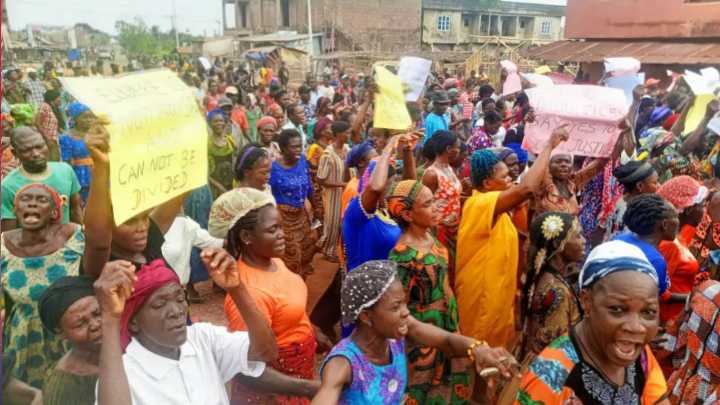Ebonyi Land Crisis: Over 100 Killed as Umuobor Community Protests Ongoing Violence
The protracted land dispute between the Umuobor community in Akaeze and their Ogwor neighbors in Ishiagu, both situated within the Ivo Local Government Area of Ebonyi State, has escalated alarmingly, leading to significant loss of life and property. On March 4, 2025, the Umuobor community organized a protest to decry the ongoing violence, which has reportedly resulted in over 100 fatalities.
The protesters, comprising widows, youths, and women, marched through their locality bearing placards with inscriptions that underscored their grievances. A poignant account from a pregnant woman, Felicia Ajali, highlighted the personal tragedies endured by many. Ajali recounted the harrowing incident where her husband and two children were killed while harvesting cassava last month. She lamented, “I sent my husband and my two children to go and harvest cassava for me last month and they were killed. Look at my condition as a pregnant woman, how can I survive this condition?” Her testimony reflects the profound human cost of the conflict.
The Elueke land, a fertile expanse, has been the epicenter of this decades-long feud. Despite a 1991 Supreme Court ruling in favor of the Umuobor community, tensions have persisted, culminating in recurrent violence. In recent developments, four individuals were killed last month while harvesting crops on the disputed land. Among the victims were three members of the Umuobor community and a woman from the Okue community, underscoring the indiscriminate nature of the violence.
Chief Sylvanus Ibeh, a leader within the Umuobor community, expressed bewilderment over the continued contestation of the land despite the Supreme Court’s verdict. He lamented the extensive losses suffered, including the destruction of schools, churches, homes, and other valuable properties. The community’s plight has been exacerbated by the apparent disregard for legal resolutions and the absence of effective enforcement mechanisms.
The Ebonyi State government has acknowledged the severity of the crisis. Governor Francis Nwifuru, in response to the escalating violence, declared the disputed land a buffer zone and established a committee to seek lasting solutions. However, the efficacy of these measures remains in question, as violence continues unabated.
The conflict’s impact extends beyond immediate fatalities. In December 2024, a truck driver from Imo State was killed along the Ishiagu/Okigwe Expressway by suspected warlords linked to the land dispute. This incident heightened tensions and prompted threats of road blockades by truck drivers from Imo State, signaling the broader economic and social ramifications of the unrest.
Further compounding the crisis, reports from January 2025 indicate that nine individuals from the Umuobor community remain missing and are feared dead. These disappearances have intensified calls for intervention from state authorities and law enforcement agencies. The community has petitioned Governor Nwifuru and the Commissioner of Police, Adaku Uche-Anya, urging the arrest and prosecution of those responsible for the killings.
The enduring nature of this conflict has raised concerns about the effectiveness of existing conflict resolution mechanisms. In November 2023, the Ebonyi State government released a white paper outlining strategies for resolving communal disputes. The document recommended re-establishing boundary markers based on colonial-era demarcations to clarify land ownership and prevent further clashes. However, the persistent violence between the Umuobor and Ogwor communities suggests that these recommendations have yet to be fully implemented or have proven insufficient in addressing the root causes of the conflict.
The Umuobor community’s recent protest serves as a stark reminder of the urgent need for decisive action. The loss of over 100 lives, displacement of residents, and destruction of property necessitate a comprehensive approach involving all stakeholders. It is imperative for the Ebonyi State government, in collaboration with federal authorities, to enforce court rulings, ensure the safety of affected communities, and facilitate dialogue aimed at achieving sustainable peace.
In conclusion, the protracted land dispute between the Umuobor and Ogwor communities in Ebonyi State has resulted in tragic loss of life and property. Despite legal interventions and governmental efforts, the conflict persists, highlighting the need for more robust and effective resolution strategies. The plight of individuals like Felicia Ajali underscores the human toll of the crisis and the urgency for lasting peace.

